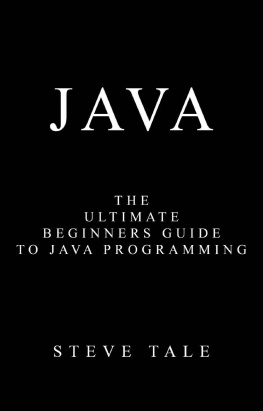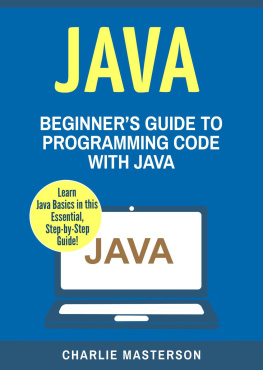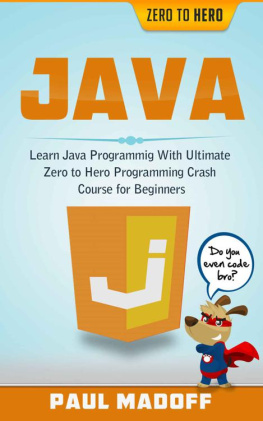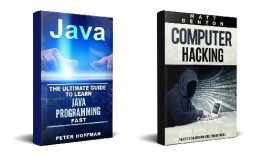Steve Tale - Java: The Ultimate Beginners Guide to Java Programming
Here you can read online Steve Tale - Java: The Ultimate Beginners Guide to Java Programming full text of the book (entire story) in english for free. Download pdf and epub, get meaning, cover and reviews about this ebook. year: 2016, publisher: UNKNOWN, genre: Home and family. Description of the work, (preface) as well as reviews are available. Best literature library LitArk.com created for fans of good reading and offers a wide selection of genres:
Romance novel
Science fiction
Adventure
Detective
Science
History
Home and family
Prose
Art
Politics
Computer
Non-fiction
Religion
Business
Children
Humor
Choose a favorite category and find really read worthwhile books. Enjoy immersion in the world of imagination, feel the emotions of the characters or learn something new for yourself, make an fascinating discovery.
- Book:Java: The Ultimate Beginners Guide to Java Programming
- Author:
- Publisher:UNKNOWN
- Genre:
- Year:2016
- Rating:3 / 5
- Favourites:Add to favourites
- Your mark:
- 60
- 1
- 2
- 3
- 4
- 5
Java: The Ultimate Beginners Guide to Java Programming: summary, description and annotation
We offer to read an annotation, description, summary or preface (depends on what the author of the book "Java: The Ultimate Beginners Guide to Java Programming" wrote himself). If you haven't found the necessary information about the book — write in the comments, we will try to find it.
Steve Tale: author's other books
Who wrote Java: The Ultimate Beginners Guide to Java Programming? Find out the surname, the name of the author of the book and a list of all author's works by series.
Java: The Ultimate Beginners Guide to Java Programming — read online for free the complete book (whole text) full work
Below is the text of the book, divided by pages. System saving the place of the last page read, allows you to conveniently read the book "Java: The Ultimate Beginners Guide to Java Programming" online for free, without having to search again every time where you left off. Put a bookmark, and you can go to the page where you finished reading at any time.
Font size:
Interval:
Bookmark:
Java
The Ultimate Beginners Guide to Java Programming
Copyright 2016 by Steve Tale All rights reserved.
This document is geared towards providing exact and reliable information in regards to the topic and issue covered. The publication is sold with the idea that the publisher is not required to render accounting, officially permitted, or otherwise, qualified services. If advice is necessary, legal or professional, a practiced individual in the profession should be ordered.
- From a Declaration of Principles which was accepted and approved equally by a Committee of the American Bar Association and a Committee of Publishers and Associations.
In no way is it legal to reproduce, duplicate, or transmit any part of this document in either electronic means or in printed format. Recording of this publication is strictly prohibited and any storage of this document is not allowed unless with written permission from the publisher. All rights reserved.
The information provided herein is stated to be truthful and consistent, in that any liability, in terms of inattention or otherwise, by any usage or abuse of any policies, processes, or directions contained within is the solitary and utter responsibility of the recipient reader. Under no circumstances will any legal responsibility or blame be held against the publisher for any reparation, damages, or monetary loss due to the information herein, either directly or indirectly.
Respective authors own all copyrights not held by the publisher.
The information herein is offered for informational purposes solely, and is universal as so. The presentation of the information is without contract or any type of guarantee assurance.
The trademarks that are used are without any consent, and the publication of the trademark is without permission or backing by the trademark owner. All trademarks and brands within this book are for clarifying purposes only and are the owned by the owners themselves, not affiliated with this document.
Known as one of the most useful, general purpose, object-oriented languages around, Java is one of the best programming languages that you could learn aboutand even master, even if you're just a beginner!
With the help of this book, you would be introduced to what Java is about, its primitive types, data types, how object oriented programming actually worksand more!
Start reading this book now and you'll learn more about Java in no time!
Once again, thank you, and enjoy!
More than anything, what you have to understand about Java is that it is a general purpose, object-oriented programming languagewhich means that it is easier to understand than other programming languages. It was designed primarily so that software developers could just code their programs once, and allow those programs run anywhere, or at least, in most platforms, as long as those platforms allow Java code to run in them.
Java primarily uses some of the same elements that C+ and C++ use, but transforms them into much simple, easy to understand versions that could also be modified depending on the developers preferences.
Java has also been created to run with enough runtime support, both for hardware and software, by means of representing each bytecode in a clear, and concise manner. For example, shih tzus, border collies, and terriers are all dogstherefore, they could all be classified as dogs, and thus, not a lot of space would be taken up in the system, and the system would be able to work in a fast manner. This is also the reason why Java is one of the worlds most powerful, and most used programming languages of all time!
The history of Java dates back to 1991 when programmers Patrick Haughton, Mike Sheridan, and James Gosling thought of a programming language that could best be used for the development of Digital TV. However, it was deemed to be way ahead of its own time, and thus, they redeveloped it based on the C+ and C++ platforms to make it easier and more economical to use.
With the redevelopment also came the core principles of Java, which are:
- It has to be portableor that it should work on as many platforms as possible, without any of them not working as well as the other;
- It should be safe and secure to useand definitely well encrypted;
- People should feel connected to it in as little time as possible, which means that they should be working with words that are somehow familiar to them, and even though it looks complex at first, sooner or later, they have to realize that it actually works;
- It should be dynamic, should work in threads, and could be modified when needed, and;
- It should perform with precision.
As you can see, these core principles give you the feeling that the programmers real made Java for the peopleso they can enjoy using more programs without having to buy too many devices.
In 1995, Sun Microsystems finally released Java 1.0the first public inception of Java, which had amazing security, no-cost runtimes, and file access restrictions across all networks. Over the years, 7 more Java releases had been made, and ever since 2006, Java started to be available through GNU, or General Public Licensemeaning it is now a free, open-source programming language. This stemmed from the public outcry that happened once when some of its contents were made private and only available for a fee, which definitely does not resonate with its core principles.
At first, Java did not run as fast as it should have, mostly because of the fact that the first couple of programs created from it required a bit more memory than those made from C+. However, over the years, its speed improved, and actually has gained better reputation in the industry than its peers.
Being a virtual machine in itself, Java now works with the so-called just in time compilation which makes it fairly easy to work with. Added support has also been given, so now, you can start making use of inner classes, arrays, assertions, string builders, and the like, alongside better optimization, too.
Of course, you would be learning more about this later but what you have to realize now is that in Java Programming, classes encapsulate all of the codesso they coup be coherent with one another, and would be able to co-exist, and all of which would be considered as their own data items. However, primitive data types, such as characters, Boolean values, integers, etc.which you'll be learning about in the next chapterare excluded in this as they know how to stand on their own.
You'd also notice the following signs to be mostly used in the syntax: double slash(//), commenting style, or asterisks and slashes (/**) (*/), and multiple line style, or (/*)(*/).
When creating a program in Java, you should save the file as . java , with child pages saved as . class . If you want to keep a certain child page, or class, private, all you have to do is save it in the same Java folder, and not in its own class folder so others won't have access to it.
A sample few lines of Java syntax are as follows:
Program HiWorld (
Public static.void (
System out PrintIn.HiWorld
)
))
You have to take note, though, that making the class public gives the program the capacity to be used in other platforms. So, unless the program is still in its development stages, and you do not want it to be accessed yet, it's best to make sure that you make it public just so you could test it out, too. After all, by using the keywords void and static, you'd get to male sure that others wont be able to edit or modify the app.
Font size:
Interval:
Bookmark:
Similar books «Java: The Ultimate Beginners Guide to Java Programming»
Look at similar books to Java: The Ultimate Beginners Guide to Java Programming. We have selected literature similar in name and meaning in the hope of providing readers with more options to find new, interesting, not yet read works.
Discussion, reviews of the book Java: The Ultimate Beginners Guide to Java Programming and just readers' own opinions. Leave your comments, write what you think about the work, its meaning or the main characters. Specify what exactly you liked and what you didn't like, and why you think so.






